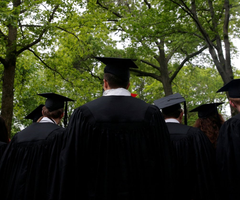MI SELECCIÓN DE NOTICIAS
Noticias personalizadas, de acuerdo a sus temas de interés

Add this to the Ivy League curricula: basic financial life skills.
Elite universities haven’t typically focused on personal finance. That is starting to change, thanks in part to rising debt levels for young Americans and growing anxiety about their economic futures.
In April, Harvard University’s economics department for the first time led a Personal Finance workshop series for undergraduates. In May, Princeton students attended the university’s inaugural Financial Literacy Day, complete with T-shirts and consultations.
“I do think this is an environment that is very stressful for many students,” said John Y. Campbell, an economics professor at Harvard who taught the workshop. “There are long-term trends like the increase in inequality, rising student debt-they make students very mindful of the challenges they’re going to face.”
Kian Mintz-Woo, a postdoctoral research associate at Princeton who participated in the Financial Literacy Day, said he craves this kind of formalized instruction.
“We’re a generation that’s really shaped by some really poor macroeconomic decisions and it’s harder for us to think that there’s sort of exogenous progress in our lives and our livelihoods,” he said.
The Ivys are part of a growing trend to teach students about money. In the last decade, community colleges, public schools and state universities have started offering personal-finance programs to meet student demand, according to the Financial Security Project at Boston College.
More states are recognizing the importance of financial literacy at the high-school level. Nineteen states now mandate high schools to educate students on basic financial knowledge before they graduate, up from 17 states in 2018 and 13 in 2011, according to the Council for Economic Education. These new requirements come as student-loan debt became an urgent national conversation. According to the Federal Reserve, the typical student-loan debt reported in 2017 ranged from $20,000 to $25,000, with total student debt approaching $1.5 trillion in outstanding loans nationwide.
Princeton’s Financial Literacy Day included mini-lectures on budgeting and credit-card use from advisers and alumni, as well as demonstrations from financial-services representatives. Mr. Mintz-Woo estimated between 150 and 200 people attended the event.
Other Ivy League schools, including Brown and Cornell, have promoted one-off workshops in recent years. This spring, University of Pennsylvania offered an Urban Financial Literacy class co-taught by Brandon Copeland, a university alum and current linebacker for the New York Jets.
Economics departments have shied away from the topic in the past, but that is starting to change.
In his day job, Harvard’s Prof. Campbell teaches classes on asset pricing and consumer protection. The personal-finance workshops in April featured four two-hour sessions where instructors lectured on debt, credit, retirement planning and other personal-finance topics. Prof. Campbell said the sessions were designed to give students the larger context of their financial decisions, beyond the simple “dos and don’ts” of budgeting and saving. Around 130 people attended the first session in the series, and Prof. Campbell said they are talking about hosting the same workshop next year.
The move to teach personal finance also reflects that Harvard, as well as other elite institutions, now enrolls students from a wider range of financial backgrounds.
Harvard has slowly increased the percentage of students from the bottom income quintile of families, from 3% between 2000 and 2005 to 5% from 2006 to 2011, according to a 2017 study on college mobility by economist Raj Chetty and others.
The school is enrolling more low-income students than its elite peers. But, compared with other schools nationwide, Harvard ranked 2011th out of the 2395 colleges studied in terms of the number of low-income students, Prof. Chetty said.
Around 49% of first-generation college students at Harvard told the Crimson student newspaper that their parents make less than $40,000 a year. More than 46% of legacy students said their households earn more than $500,000 annually.
“This was one of the challenges when designing the course: how to make it relevant for such a wide range,” Prof. Campbell said. “Some students want to understand stock-market investing, others want to talk about how to get out from under credit-card debt.”
Alyn Wallace, a senior at Harvard from New Orleans, who attended the workshop series, said she has been thinking about retirement planning for a long time. As a child, she even labeled a jar “Retirement” and collected loose change in it.
Even so, she said some parts of the course didn’t feel relevant to every student-using $50,000 as an example of a “low end” on a salary spectrum or discussing how to prepare tax documents for your domestic help.
“It was a curious dynamic to watch, because it’s a very hard line to walk, even outside of the workshop,” she said.
Prof. Campbell said he and others are aware that there is a range of economic backgrounds and expectations. But, it is still Harvard.
“Realistically, a lot of students who graduate from Harvard will end up having some form of domestic help and will in the course of their careers make more than $50,000 a year,” he said. “But we must make sure we don’t convey the expectation that this is going to be everybody.”
BY Julia Carpenter
El expresidente Trump, quien asumirá su nuevo mandato el próximo 20 de enero, destacó la experiencia de Claver Carone en temas de América Latina
El salario mínimo mensual se ha elevado de US$482 a US$627 para 2025, según anunció el martes el ministro de Trabajo de ese país
También dijo que prevé que las ventas de gas de Gazprom aumenten este año en 155.000 millones de rublos (US$1.500 millones)